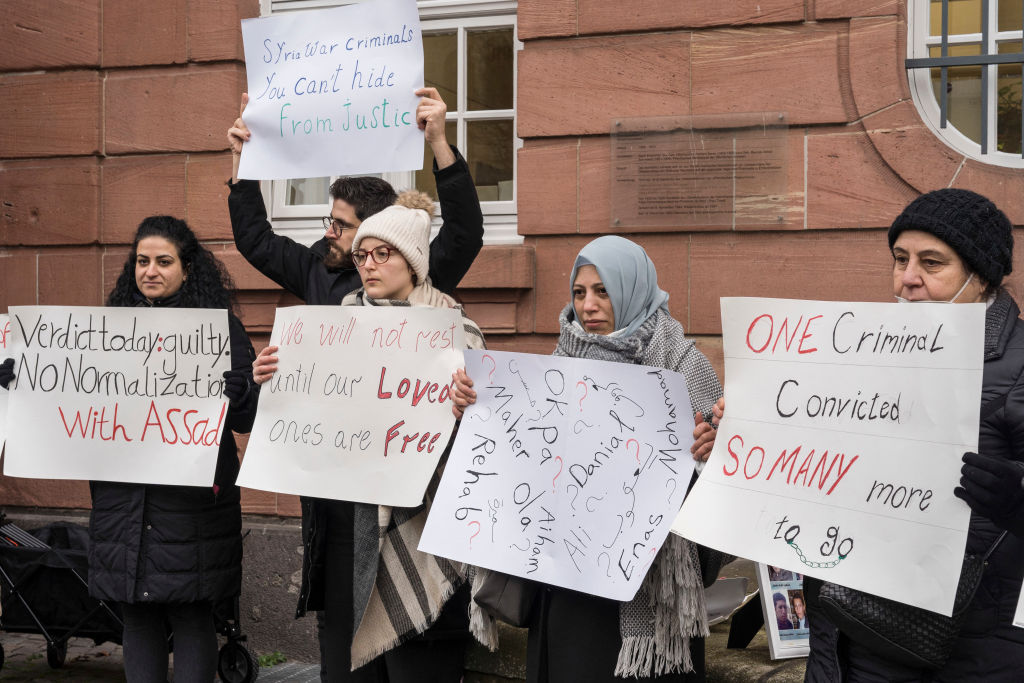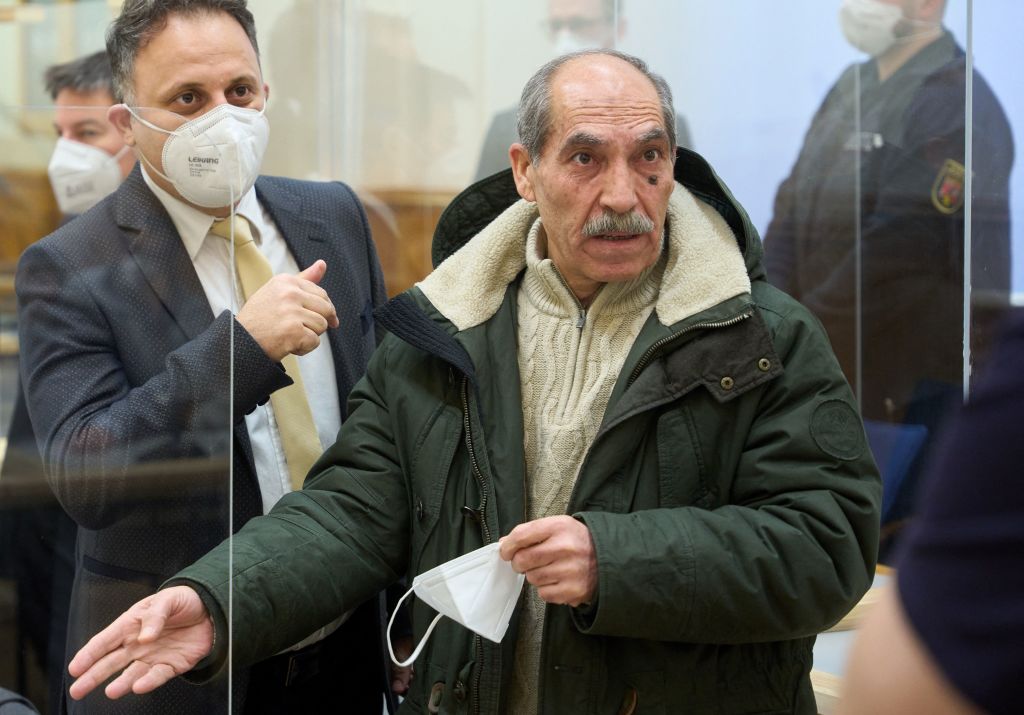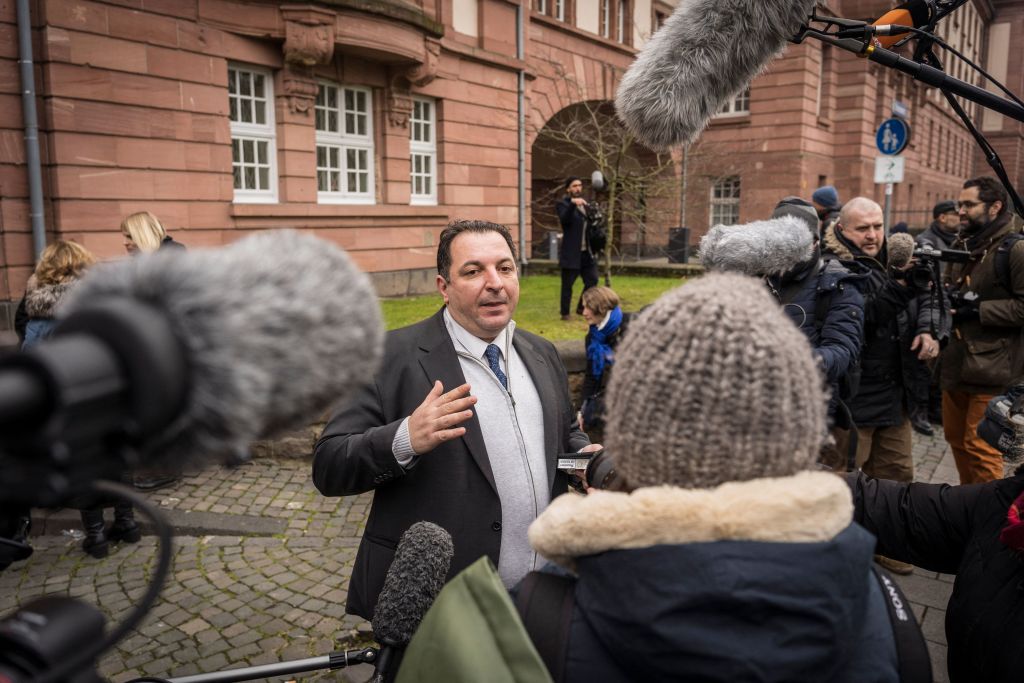
It was a cold morning in Berlin in February 2019 when Patrick Kroker, a lawyer at the European Center for Constitutional and Human Rights (ECCHR), called to ask me to his office. I arrived to find him there with two Syrian lawyers who have played central roles in our country’s quest for justice: Anwar Al Bounni and Ibrahim El Kassem.
Patrick told us: “German police have arrested Colonel Anwar Raslan.”
Using the principle of universal jurisdiction, Germany can bring charges against the perpetrators of war crimes and crimes against humanity, even if the crimes happened outside of Germany. Raslan, a senior Syrian intelligence officer, led investigations at the notorious Branch 251 facility in Damascus. Following his arrest, he became the main defendant in the world’s first criminal case dealing with state-led torture in Syria.
Read More: How the Syrian War Has Left a Toxic Environmental Legacy
On Jan. 13, a court in the German town of Koblenz sentenced Raslan to life in prison for crimes against humanity, involving the systematic use of torture against thousands of peaceful pro-democracy protestors who rose up in 2011. The verdict against him marks a beginning for justice for the Syrian people. Understanding how it happened can help define a path to greater justice in the future.

Survivors of torture in Syria
That meeting in Berlin galvanized my organization, the Paris-based Syrian Center for Media and Freedom of Expression (SCM). For the first time in Syria’s history, victims of atrocities would have the chance to confront a once powerful suspect before an independent judiciary. Survivors of torture under interrogation in Syrian jails had an opportunity to prove to the world the veracity of our stories of inconceivable suffering and death.
This was personal. I was detained three times in Syria: twice briefly in 2011, then in 2012 for three and a half years. My crimes were protesting against the government, and then documenting, through SCM’s work, that government’s violent crackdown.
We began our work on the case by contacting torture victims who had been arrested in 2011 and 2012 and detained in Branch 251. It was not difficult to reach them. We knew many of them personally. From 2011, SCM had documented more than 400,000 Syrian torture cases.
We connected victims willing to testify in the case with the ECCHR and the Open Society Justice Initiative, where lawyers organized victim representation in the proceedings against Raslan. Without the courage and determination of those survivors, nothing could have been achieved. These would have been merely abstract legal proceedings. But now we could build a vivid, legal narrative of torture and extrajudicial killings, which were, and still are, pillars upon which Syria’s brutal regime has remained in power for more than five decades. My own chance to testify as a torture survivor came in September 2020.
Read More: Syrian Torture Archive—When Photographs of Atrocities Don’t Shock
Defectors from the Syrian security apparatus and former workers in military and civilian hospitals provided crucial inside information. They testified about intelligence structures, especially those of Branch 251, as well as chains of command. With their assistance, we supplied the courts with the names of scores of officials who worked at Branch 251 at the time the defendant was stationed there. Regime defectors provided the coordinates of four mass graves near Damascus, and the testimony of a man tasked with burying corpses from 2011 to 2017 corroborated this.
The Syrian bureaucracy has also documented its own crimes. A military defector codenamed “Caesar,” and “Sami,” a relative who assisted him, smuggled thousands of photos out of Syria showing mutilated, tortured, and emaciated corpses strewn across the floors of Syrian government detention centers. Leaked internal correspondence from the security services, especially those provided by Fathi Bayoud, founder of Zaman Alwsl, a Syrian news website, provided conclusive evidence of the systemic, heinous abuse of detainees from the moment of their arrest through to their death under torture, and their burial by the military police. They showed that this happened with the full knowledge of Syria’s National Security Office, which reports directly to President Bashar al-Assad.
We provided the court with leaked hospital documents proving that torture and ill-treatment specifically at Branch 251 led to death. One document was a memo submitted to the head of Branch 251, documenting a dispute between his staff and forensic medicine officials at a military hospital, who were overwhelmed by the number of corpses they were receiving.

Justice for victims of the Syrian regime
Branch 251’s register of deceased people included the name of the detainee Dr. Hayan Mahmoud, who had been missing since his arrest by the branch in 2012. His family filed a grievance against Raslan in the Koblenz court. They and some others were able to see a mid-level official responsible for their anguish held to account in a trial that was a foundational step in the fight against impunity for the grave crimes committed in Syria. Germany’s application of universal jurisdiction succeeded in transferring the issue of accountability from the framework of human rights statements and ethical condemnations to a practical and applied remedy.
But the victory in Koblenz is deeply insufficient. Hundreds of thousands of Syrian families are still searching for the whereabouts or fate of their loved ones. Organizations like mine will continue to build cases against the Syrian officials responsible. At the time of Raslan’s arrest, Kroker and I had been working to bring to justice one of Syria’s most notorious war criminals, director of air force intelligence Major General Jamil Al Hassan. A German court issued a warrant for him in 2018, though Hassan remains out of reach in Syria.
Read More: How Syrian Medics Endured 10 Years of War
The trial in Koblenz should prompt other countries to use their legal systems to deliver justice for the Syrian people. States should also establish Syria war crimes tribunals, especially for chemical weapons use, following the Nuremberg precedent. International pressure must continue, to find a political solution to the crisis in Syria, and to hold the Syrian regime to account for its crimes.
The regime continues to torture and kill countless Syrians. There cannot be sustainable peace in Syria, a safe return for refugees like myself, or a real defeat of terrorism, unless the perpetrators face justice. The road to Koblenz has been long, but it is only one step in the long journey toward justice for my country.
More Must-Reads from TIME
- Cybersecurity Experts Are Sounding the Alarm on DOGE
- Meet the 2025 Women of the Year
- The Harsh Truth About Disability Inclusion
- Why Do More Young Adults Have Cancer?
- Colman Domingo Leads With Radical Love
- How to Get Better at Doing Things Alone
- Michelle Zauner Stares Down the Darkness
Contact us at letters@time.com